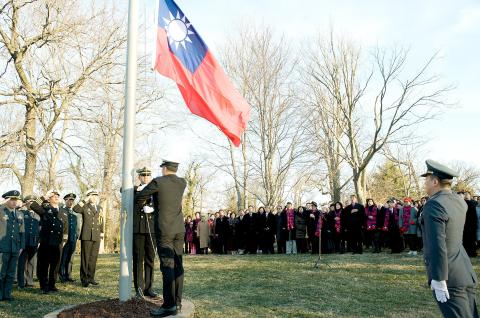The raising of the Republic of China’s (ROC) national flag at a New Year’s Day ceremony at Twin Oaks Estate in Washington last week was “not consistent” with US policy, US Department of State spokesperson Jan Psaki said on Monday.
“We did not know about the Jan. 1 flag-raising at Twin Oaks in advance,” she said.
The statement — made in answer to a question at the daily press briefing — came as a surprise.

Photo: CNA
Representative to the US Shen Lyu-shun (沈呂巡) was quoted following the flag-raising ceremony as saying he had notified the administration of US President Barack Obama in advance and was granted permission to raise the flag as long as it was not widely publicized.
The Taipei Economic and Cultural Representative Office (TECRO) in Washington referred questions about Psaki’s reaction to the Ministry of Foreign Affairs in Taipei.
According to earlier reports, Beijing was “furious” about the flag-raising and lodged a formal objection.
It was believed to be the first time that the Taiwanese flag had been raised at Twin Oaks — the residence of the nation’s official representative to the US — since the US switched diplomatic recognition from Taipei to Beijing 36 years ago.
Sources who closely monitor the Taiwan-US relationship told the Taipei Times on Monday they were “very surprised” by the State Department statement because it seemed “inconceivable” that TECRO would raise the flag without US permission.
“Why do it now? It doesn’t make any sense,” one source said.
He said the relationship was so “sensitive” and subject to such tight diplomatic protocols that nothing could be gained and potentially much goodwill could be lost by ignoring the agreed-upon rules.
Psaki said that the US remained fully committed to the “one China” policy, based on the three communiques and the Taiwan Relations Act.
“No US government personnel attended the event in any capacity,” Psaki said.
“Nothing has changed as it relates to our relationship,” she added.
A US reporter asked: “Are you objecting to a private ceremony at which there was — that some people raised the Taiwanese flag?”
“We just said the ceremony is not consistent with our policy. That’s it,” Psaki replied.
The reporter pressed: “Well, so what?”
Psaki said she had been asked for the US position on the flag-raising and was giving that position.
The reporter then asked: “If I raise the flag of Narnia over my house, that’s going to be inconsistent with US policy?”
There was laughter in the press room as Psaki answered: “We may talk about you, but I don’t know if I’ll have a US government comment on it.”
The reporter asked if the US government was involved “in any way, shape or form” in the raising of the Taiwanese flag at Twin Oaks.
“No, we were not,” Psaki said. “We didn’t attend. We didn’t know about it. That’s our specific comment.”
The reporter asked: “Can you not raise the Taiwan flag in the United States? Is that what you’re saying?”
“I don’t have anything more,” Psaki replied.
Finally, she was asked if China had made a protest and she said: “I’d point you to the Chinese on that.”

MAKING WAVES: China’s maritime militia could become a nontraditional threat in war, clogging up shipping lanes to prevent US or Japanese intervention, a report said About 1,900 Chinese ships flying flags of convenience and fishing vessels that participated in China’s military exercises around Taiwan last month and in January have been listed for monitoring, Coast Guard Administration (CGA) Deputy Director-General Hsieh Ching-chin (謝慶欽) said yesterday. Following amendments to the Commercial Port Act (商港法) and the Law of Ships (船舶法) last month, the CGA can designate possible berthing areas or deny ports of call for vessels suspected of loitering around areas where undersea cables can be accessed, Oceans Affairs Council Minister Kuan Bi-ling (管碧玲) said. The list of suspected ships, originally 300, had risen to about 1,900 as

Right-wing political scientist Laura Fernandez on Sunday won Costa Rica’s presidential election by a landslide, after promising to crack down on rising violence linked to the cocaine trade. Fernandez’s nearest rival, economist Alvaro Ramos, conceded defeat as results showed the ruling party far exceeding the threshold of 40 percent needed to avoid a runoff. With 94 percent of polling stations counted, the political heir of outgoing Costa Rican President Rodrigo Chaves had captured 48.3 percent of the vote compared with Ramos’ 33.4 percent, the Supreme Electoral Tribunal said. As soon as the first results were announced, members of Fernandez’s Sovereign People’s Party

Japan’s strategic alliance with the US would collapse if Tokyo were to turn away from a conflict in Taiwan, Japanese Prime Minister Sanae Takaichi said yesterday, but distanced herself from previous comments that suggested a possible military response in such an event. Takaichi expressed her latest views on a nationally broadcast TV program late on Monday, where an opposition party leader criticized her for igniting tensions with China with the earlier remarks. Ties between Japan and China have sunk to the worst level in years after Takaichi said in November that a hypothetical Chinese attack on Taiwan could bring about a Japanese

MORE RESPONSIBILITY: Draftees would be expected to fight alongside professional soldiers, likely requiring the transformation of some training brigades into combat units The armed forces are to start incorporating new conscripts into combined arms brigades this year to enhance combat readiness, the Executive Yuan’s latest policy report said. The new policy would affect Taiwanese men entering the military for their compulsory service, which was extended to one year under reforms by then-president Tsai Ing-wen (蔡英文) in 2022. The conscripts would be trained to operate machine guns, uncrewed aerial vehicles, anti-tank guided missile launchers and Stinger air defense systems, the report said, adding that the basic training would be lengthened to eight weeks. After basic training, conscripts would be sorted into infantry battalions that would take